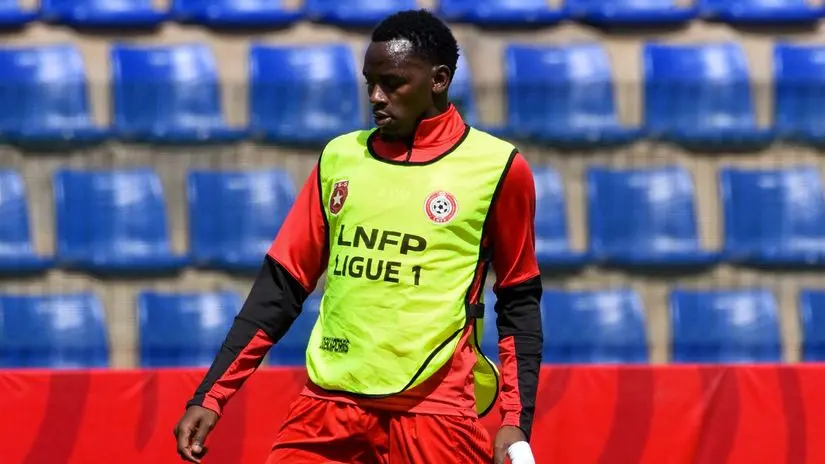From Nairobi to North Africa, the week belonged to Kenyan clubs writing contrasting chapters in Africa’s showpiece competitions. In the thick of it all, CAF Champions League & Confederation Cup – Kenyan Teams became more than a fixture list, it turned into a canvas of tactics, resilience, and the emotion that sport often reserves for its bravest protagonists.
Nairobi United stood tallest at the Ulinzi Sports Complex, defeating Tunisia’s Étoile du Sahel 2-0 in the CAF Confederation Cup second-round first leg. It was a result forged in belief and discipline, the kind that makes history feel within reach. Across the same pitch a day earlier, FKF Premier League champions Kenya Police FC were taught a hard lesson by Sudanese giants Al Hilal Omdurman, losing 1-0 in the CAF Champions League first leg, a reminder that the margins at this level are razor thin.
Nairobi United put Tunisia giants on the ropes
If there was ever a moment to signal Kenya’s return to the continental conversation, it came from Nairobi United. Goals from Ovella Ochieng and Duncan Omala delivered a precious two-goal cushion against a two-time Confederation Cup winner, and the performance suggested the margin could have been bigger.
The tie was relocated from Nyayo National Stadium to Ulinzi due to national events around the memorial service for the late former Prime Minister Raila Odinga, and both sides observed a moment of silence before kickoff. Nairobi United’s players later huddled in the corner, raising a replica shirt inscribed “Baba” and the number 80, a heartfelt tribute that blended sport with shared national memory.
Despite playing without home support, the Kenyan debutants were bold from the first whistle. They created a flurry of chances, with Duncan Omala striking the crossbar and then missing a gilt-edged opportunity, while Michael Karamor and Shami Kibwana also went close. It was the assertiveness, the refusal to be cowed by pedigree, that set the tone for what followed.
Inside the Nairobi United dressing room
Technical director Salim Ali was proud, yet purposefully restrained. He praised the clean sheet and the two-goal lead, but urged focus ahead of the return leg in Tunis. “Leading 2-0 is a good thing. It is important that we did not concede. It is a bravo to the whole team. But we still have work to do,” he said, adding that the group will maintain a balanced approach, attacking with intent and defending with structure.
The message mirrored the night’s performance. United’s young core, new to the continental stage, showed courage and composure. Salim Ali framed it as a journey, not a destination, dedicating the win to the late Raila Odinga and to club patron Johnson Sakaja. He emphasized learning and growth, a perspective that fits a team still unbeaten in its debut continental campaign and now carrying a sizeable advantage to North Africa.
| CASINO | BONUS | INFO | RATING | |
|---|---|---|---|---|
|
bonus
Welcome package: 190000 KES + 150 FS!
See 12 Bonuses
|
info
Experience the thrill of our casino! Spin, win, and enjoy top-notch games anytime ALSI-202411073-FI2 |
|||
|
bonus
500% bonus on first 4 deposits!
See 5 Bonuses
|
info
10 crash games, mobile-first site, 500% welcome bonus BK 000678 |
|||
|
bonus
90 free spins weekly!
See 4 Bonuses
|
info
OGL/2024/137/0132 secure platform with top casino games & bonuses. |
|||
|
bonus
100% bonus up to KSH 10,000
See 3 Bonuses
|
info
60+ software providers, over 5,000 casino games, BK 0000751 PG 0000451 |
Étoile du Sahel accept the damage and send a warning
Étoile’s Kenyan defender Alphonce Omija offered a frank assessment by admitting the Tunisians were fortunate to escape Nairobi with only a two-goal defeat. “Yes, we were lucky, very lucky,” he said, while promising a fierce response on home soil. He explained that their plan in the first leg was to limit the damage and stay within reach of a comeback, a strategy that keeps the contest alive in Tunis.
There was respect in his words for United’s intensity, and a competitive edge, too. Omija cautioned that the environment in Tunisia will be different, a cauldron of passion and pressure. The return leg at the Stade Olympique de Sousse will test United’s nerve and game management in ways the first leg could not.
Why the scoreline matters and what comes next
A 2-0 home win in the CAF Confederation Cup is leverage, not a guarantee. The aggregate winner enters the group stage, the same frontier Kenyan clubs have often struggled to cross. For context, the last Kenyan team to reach this phase of the Confederation Cup was Gor Mahia in 2018, a benchmark Nairobi United are now within touching distance of matching at the first attempt.
The second leg in Tunisia will demand maturity. Expect United to look for balance, as Salim Ali promised, with a focus on controlled possession, compact distances between the lines, and selective pressing. The capacity to absorb pressure, then transition cleanly to exploit space behind Étoile’s fullbacks, could be decisive. One away goal would force the hosts to chase a mountain.
From NEC FC to this stage, the arc of Nairobi United’s rise
Nairobi United’s campaign began with grit in the first preliminary round against NEC FC of Uganda. A 2-2 draw away, followed by a 1-1 draw at home, sent the Kenyans through on the away goals rule. That result revealed the team’s capacity to manage tense moments, a quality that will be invaluable in Sousse.
There is also a psychological edge. United have now outplayed a North African heavyweight in open play. The product of that performance is confidence, and the task now is to turn belief into a complete two-leg performance, the kind that stamps a club’s identity beyond its borders.
Kenya Police learn harsh lessons against Al Hilal
Where Nairobi United found fluency, Kenya Police encountered a masterclass in Champions League-level game management. Under coach Etienne Ndiyirangije, Police started in a 4-1-3-2 with an aggressive high press, aiming to disrupt Al Hilal’s buildup and win second balls. Their plan in possession relied on going direct from deep into channel runs, bypassing midfield to fight for territory.
Al Hilal, guided by Romanian coach Laurentiu Reghecampf, built from a base 4-4-1-1, using a 2-1-4-3 structure in early buildup. The fullbacks pushed high to provide width, while the front line narrowed to combine in tight pockets. The key battleground emerged on Al Hilal’s right flank, where right back Steven Ebuela and star man Adama Coulibaly repeatedly overloaded against Daniel Sakari, creating 2v1 scenarios that ripped open Police’s block.
That pattern, aided by pressure on Police pivot Charles Ouma from captain Taha Abdelrazig, created the decisive moment. Taha squeezed Ouma, the ball broke to Coulibaly, and the forward beat his man before finishing past Job Ochieng. It was a goal sourced from half-space manipulation and calculated superiority on the right side, the sort of detail that separates group-stage regulars from hopefuls.
Adjustments and the second leg picture for Police
Ndiyirangije’s changes after the break injected energy. Edward Omondi and David Okoth came on for Eric Zakayo and Exauce Misuri, and with later introductions for Clinton Kinanga and Geoffrey Onyango, Police tilted the contest toward crosses and territory. Al Hilal responded by retreating into a lower block, protecting their lead while keeping Coulibaly and Sunday Damilare high for rest attacks.
The 1-0 deficit is not fatal, and the second leg has been moved to the Benina Martyrs Stadium in Libya due to political instability in Sudan that has halted domestic sports activities. Reghecampf cautioned that despite the first-leg win, nothing is settled, even pointing to a recent Kenya Police tie where they won away then lost at home against Mogadishu City Club, a reminder of how swiftly momentum can turn in two-leg football.
The Al Hilal coach insisted that his side prefers to press high and attack, even though game state forced them to defend the lead for much of the second half. He expects more control in the return leg, though he acknowledged the need for time to refine the team’s rhythm. The winner books a place in the CAF Champions League group stage, a transformative step for either club.
Venue change and the human backdrop
The choice of Ulinzi Sports Complex as Nairobi’s stage was more than logistics. The match initially slated for Nyayo had to move because of the national memorial for Raila Odinga, and the quiet stands, without home support, gave the night a solemn undertone. Football paused to remember, then resumed with purpose.
In the Champions League, Al Hilal’s forced relocation to Libya, and their need to compete in Mauritania in order to qualify for this season’s CAF campaign, underscored a different reality, that of clubs adapting to wider instability. The competition endures, carried by players and coaches whose work must navigate conditions far beyond the pitch.
The money at stake for Nairobi United
History is one incentive, sustainability is another. Nairobi United have already earned 100,000 dollars from the preliminary rounds. If they complete the job and reach the CAF Confederation Cup group stage, the payout rises to 400,000 dollars, funds that can reshape infrastructure, player development, and long-term competitiveness.
- Group stage qualification brings 400,000 dollars,
- quarterfinal qualification earns 550,000 dollars,
- semifinalists get 750,000 dollars, finalists receive 1 million dollars for runners-up and 2 million dollars for champions.
For a newly promoted FKF Premier League club, those figures speak to the scale of opportunity. The club’s patronage, led by Johnson Sakaja, has provided a platform, but continental prize money can accelerate the project in ways that domestic revenues rarely allow.
What the protagonists are saying
Salim Ali struck the right balance between ambition and caution. “We will play the same way. We will remain cautious. We attack, but we also defend well. The tactics are important, and we must maintain a good balance,” he said, also highlighting the inexperience of his young squad and the importance of learning to convert chances on big nights.
On the other side, Étoile’s Alphonce Omija offered respect mixed with competitive steel. “They missed many chances, but they will suffer in the second leg,” he warned, while describing the atmosphere in Tunisia as intense and unrelenting. His comments set the stage for a high-pressure return, the kind of contest that tests not only systems, but composure.
Reghecampf kept his focus on process over scorelines. “We had an away win, which is important, but you know, in football, everything is possible,” he noted. He reiterated his preference for front-foot football, then conceded that his team must manage phases better to secure multi-goal cushions when on top.










